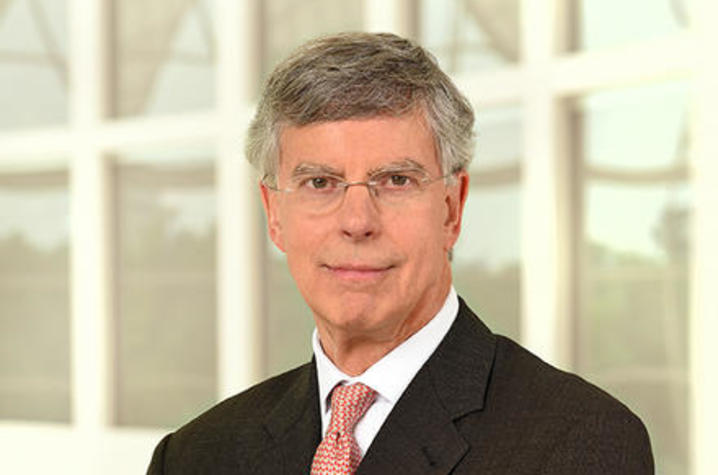Ambassador William B. Taylor to address Russia, Ukraine and the US

LEXINGTON, Ky. (Oct. 25, 2022) — Each autumn, the University of Kentucky Patterson School of Diplomacy and International Commerce hosts a conference on foreign and diplomatic affairs. While the theme changes each year, every meeting builds on the Patterson School’s efforts to explore the full breadth of professional activities in diplomacy, international commerce, national security, intelligence and development, especially as they pertain to the needs of the Commonwealth of Kentucky.
The theme of this year’s Fall Conference is “The New Cold War.” From 6:30-8 p.m. Thursday Oct. 27, Ambassador William B. Taylor will give the keynote address on “Russia, Ukraine, and the United States.”
Taylor is vice president of the Russia and Europe section at the U.S. Institute of Peace. He served as the U.S. Ambassador to Ukraine from 2006 to 2009 under Presidents George W. Bush and Barack Obama, and as acting ambassador to Ukraine from June 2019 to January 2022 under President Donald Trump. The UK and Lexington communities are invited to join Ambassador Taylor’s address in the William T. Young Library Auditorium. Parking is available in the Rose Street parking garage.
Day two of the Fall Conference is restricted to Patterson School students and invited guest speakers, which will include 13 policymakers and experts from government, think tanks and NGOs and academia. There are four panel discussions centered around the Patterson School's four major/minor concentrations:
- Security and Intelligence: With Russia's invasion of Ukraine and the heating up of a competition with China, institutions of government must now repurpose themselves again for security competition in the New Cold War. Panelists include Mark Duckenfield, chair of the Department of National Security and Strategy, U.S. Army War College; Gail Helt, Security and Intelligence Studies Program Coordinator, King University; and Magnus Nordenman, international market analysis lead, Lockheed Martin.
- Diplomacy: As crises like the current war in Ukraine illustrate, the world continues to struggle to manage conflicts among major and regional powers. What is lacking in terms of the diplomatic tools and approaches that have been and are being employed? Panelists include Denis Makarov, former associate professor of political science at Moscow State Pedagogical University; Mara Rudman, executive vice president for policy, Center for American Progress; and Chuck Ziegler, professor of political science and University Scholar, University of Louisville, and director, Grawemeyer Award for Ideas Improving World Order.
- International Commerce: Trade, aid, investment, energy and sanctions were used extensively throughout the first Cold War and will be primary instruments moving forward. This panel will examine the future of these initiatives and their effectiveness. Panelists include Richard Langstaff, partner, Kaican LLP; Randi Levinas, executive vice president and chief operating officer, U.S.-Russia Business Council; and Seth Schindler, senior lecturer, Urban Development & Transformation at the University of Manchester.
- Development: The first Cold War incurred inestimable costs for the developing world in lives and lost economic opportunities. As we consider a new Cold War, the struggle for influence is again increasing. What are the implications this renewed influence race? How can policy makers in developing countries avoid the costs of the first? Panelists include Dave Harden, CEO, Q2 Impact; Joseph Sany, vice president, Africa Center, United States Institute for Peace; and Helen Yan Wang, senior academic researcher, Global China Initiative.
About the Patterson School of Diplomacy and International Commerce
For more than 60 years, the Patterson School of Diplomacy and International Commerce has provided an exceptional master’s degree program that prepares future leaders for rewarding careers in international affairs. Patterson graduates pursue exciting careers with governments, international organizations, NGOs, think tanks and in the private sector.
The program is notable for its passion. With a faculty dedicated to providing an unparalleled learning experience, we ensure students develop the knowledge and skills necessary to effectively maneuver on the world stage. Patterson School faculty are a mix of exceptional scholars and practitioners with decades of experience in diplomacy, commerce, business, defense, development and intelligence. They know firsthand what is needed to succeed in the international arena.
Our graduates seek more than just a profession; they want to make the world better. Our professional master's program offers major/minor concentrations in four areas: diplomacy; international commerce; international organizations and development; international security and intelligence.
For more information about the 18-month M.A. in Diplomacy program, visit the Patterson School’s website. Applications are currently being accepted for the Fall 2023 term. Apply through the UK Graduate School.
As the state’s flagship, land-grant institution, the University of Kentucky exists to advance the Commonwealth. We do that by preparing the next generation of leaders — placing students at the heart of everything we do — and transforming the lives of Kentuckians through education, research and creative work, service and health care. We pride ourselves on being a catalyst for breakthroughs and a force for healing, a place where ingenuity unfolds. It's all made possible by our people — visionaries, disruptors and pioneers — who make up 200 academic programs, a $476.5 million research and development enterprise and a world-class medical center, all on one campus.




